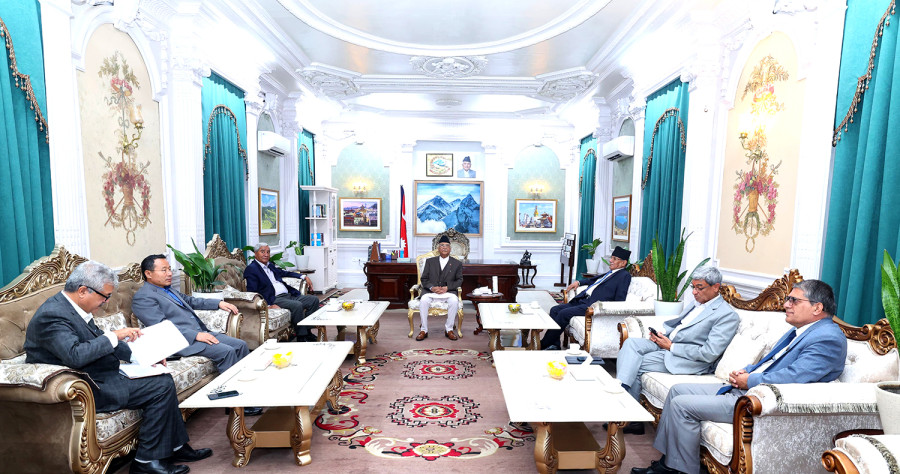National
Big 3 agree on taking victims along on transitional justice process
Meeting of major parties decides to help panels provide justice to war-era victims.
Post Report
Top leaders of three major parties have decided to engage insurgency-era victims in the transitional justice process, even as the latter continue to disown the leadership of both the commissions constituted last month.
A meeting attended by Prime Minister and CPN-UML chair KP Sharma Oli, Nepali Congress President Sher Bahadur Deuba and CPN (Maoist Centre) chair Pushpa Kamal Dahal, together with their second-rung leaders, also agreed to support the two commissions in concluding the process.
“I updated the top leadership on the progress made in the process, including on the reservations from a section of victims. They unanimously agreed to create an environment to engage the dissidents in the process,” Agni Kharel, the prime minister’s human rights and transitional justice adviser, who was present in the meeting, told the Post.
“They concluded the need to engage them at the commissions, government and the political level.”
Different victims’ groups have refused to cooperate with the office bearers from the Truth and Reconciliation Commission and the Commission of Investigation on Enforced Disappeared Persons, claiming that the government bulldozed their appointments without consultations.
Ignoring their reservations, the government, on May 14, appointed a five-member team led by Mahesh Thapa in the truth commission, and an equal number of team members under Leela Devi Gadtaula at the disappearance commission.
The victims’ groups have claimed that the appointments were made ignoring their calls for a victim-centric transitional justice process.
“A new appointment process is our bottom line. We are not going to engage with any agencies if our demand is not addressed,” Gopal Shah, chairperson of the Conflict Victims Network, told the Post.
They have even threatened to constitute parallel civil commissions, refusing to participate in the state-led process.
As envisioned in the revised Enforced Disappearances Enquiry, Truth and Reconciliation Commission Act, the TRC and the disappearance commissions issued separate notices calling for applications from the victims. Three months has been given for the conflict victims (who could not file complaints in the past for various reasons) to lodge their cases after the commissions are formed.
The three-month window was provisioned in the Act mainly because most of the sexual violence and rape survivors did not lodge their complaints in the past citing lack of confidentiality and privacy.
Though different groups have said they would not register any complaints, the two commissions say they have already received thousands of complaints in the past month.
While the ruling and opposition parties stand sharply divided on various issues, they have a unanimous position on transitional justice—making the existing commissions successful. Kharel said the government has vowed to ensure that both commissions will not be deprived of any kind of resources. The main opposition, on the other hand, has agreed to support the process.
Through the national budget, the government has earmarked Rs1 billion to be spent on transitional justice in the upcoming fiscal year. Similarly, the Ministry of Home Affairs, in coordination with the prime minister’s office, has drafted a policy for providing free medical services to the conflict victims at the provincial hospital.
Similarly, the Ministry of Law, Justice and Parliamentary Affairs is working on a regulation of the Enforced Disappearances Enquiry, Truth and Reconciliation Commission Act.




 10.12°C Kathmandu
10.12°C Kathmandu














